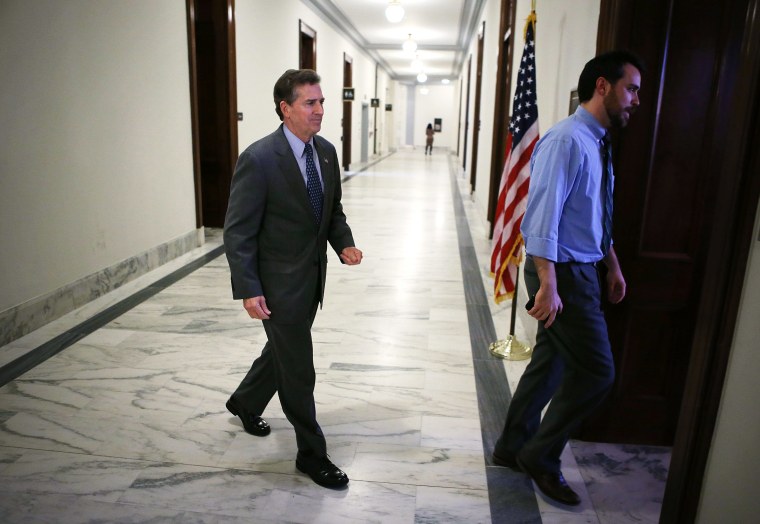A few weeks ago, Heritage Foundation President Jim DeMint, as part of his anti-healthcare crusade,
insisted Republicans "did not litigate the Obamacare issue" in 2012, so the presidential election didn't really count. The comments drew widespread ridicule, and made DeMint appear rather foolish.
Naturally, this led DeMint to believe it would be a good idea to repeat the argument in a
new op-ed for the
Wall Street Journal.
...ObamaCare was not the central fight in 2012, much to the disappointment of conservatives. Republicans hoped that negative economic news would sweep them to victory, and exit polls confirmed that the economy, not health care, was the top issue. The best thing is to declare last year's election a mistrial on ObamaCare.
For the former senator, the key is disputing the notion that elections have consequences. In reality, American voters were offered a clear choice between two major-party candidates with very different platforms. One vowed to destroy the Affordable Care Act; the other promised to implement it. The latter won, as did his party in congressional elections.
DeMint's principal goal, apparently, is to convince Republicans that the will of the American electorate just isn't that important. If they disagree, DeMint and his political operation at Heritage intend to punish allies who fail to toe the party line.
With this in mind, Sen. Orrin Hatch (R-Utah) appeared on MSNBC yesterday and said something interesting. "Heritage used to be the conservative organization helping Republicans and helping conservatives and helping us to be able to have the best intellectual conservative ideas," he
argued. "There's a real question in the minds of many Republicans right now, and I'm not just speaking for myself: Is Heritage going to go so political that it really doesn't amount to anything anymore?"
This is a specific kind of criticism that shouldn't be overlooked. Hatch, who's no doubt worked with Heritage many times during his 36 years in the Senate, isn't complaining about the organization's position on a contentious issue; he's questioning whether Heritage even matters anymore.
The role of Heritage and institutions like it don't get a lot of attention outside the Beltway, but parties and even political movements have traditionally relied on an intellectual core that bolsters a policy agenda with research, scholarship, data, and substance. For the Republican Party, this meant Heritage played an important role for years in helping guide the GOP's national direction.
That's changing. Republicans are becoming a post-policy party, in part due to ideological radicalism, and in part because of the deterioration of the party's intellectual infrastructure -- captured perfectly by Heritage's transition from being a think tank to being an activist group.
Indeed, I'm reminded of
this recent gem from Molly Ball on Heritage's dwindling credibility under DeMint's leadership.
[T]here is more at stake in Heritage's transformation from august policy shop to political hit squad than the reputation of a D.C. think tank or even the careers of a few squishy GOP politicians. It is the intellectual project of the conservative movement itself. Without Heritage, the GOP's intellectual backbone is severely weakened, and the party's chance to retake its place as a substantive voice in American policy is in jeopardy.
Paul Krugman speculated recently as to whether Heritage may be "
destroying its own usefulness." Op-eds like today's gem from DeMint only help seal the deal.
